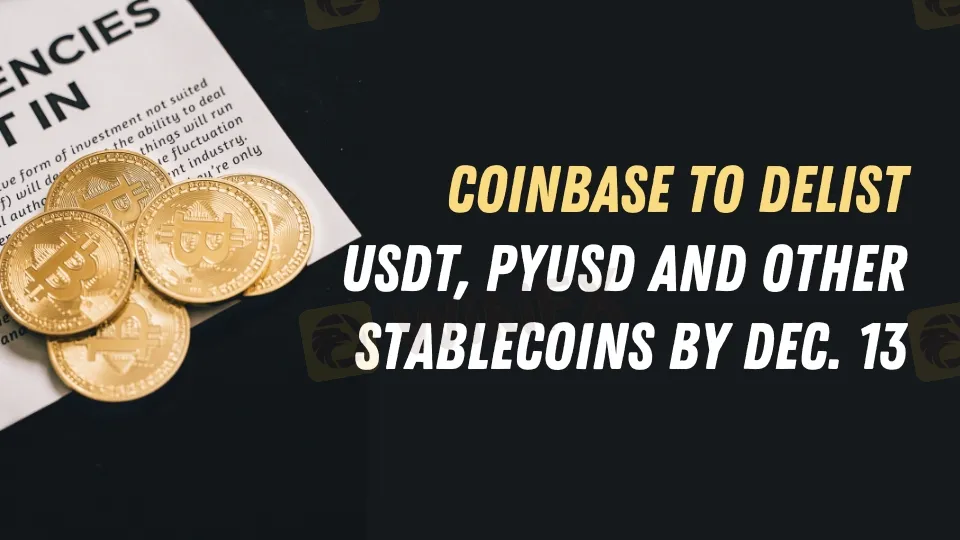简体中文
繁體中文
English
Pусский
日本語
ภาษาไทย
Tiếng Việt
Bahasa Indonesia
Español
हिन्दी
Filippiiniläinen
Français
Deutsch
Português
Türkçe
한국어
العربية
Coinbase to Delist USDT, PYUSD and Other Stablecoins by Dec. 13
Abstract:Coinbase Europe will delist USDT, PYUSD, and other stablecoins as part of MiCA's new regulations. Affects crypto users and exchanges in Europe ahead of the compliance deadline.

Coinbase and Other Exchanges to Delist USDT Before MiCA Deadline
On December 13, 2024, cryptocurrency exchanges around Europe, including Coinbase Europe, Coinbase Germany, and Coinbase Custody International, will delist numerous prominent stablecoins, including Tether's USDT. This decision is consistent with the implementation of the European Union's Markets in Crypto-Assets Regulation (MiCA), which requires stablecoin issuers to comply with tough new laws by the end of the year.
Delisted assets will include USDT, PAX, PYUSD, GUSD, GYEN, and DAI. Coinbase will, however, continue to offer MiCA-compliant stablecoins such as USD Coin (USDC) and the euro-backed EURC, which is a collaboration with Circle. Users who own non-compliant stablecoins should convert them to authorized alternatives before the delisting date.
Tether's Compliance with MiCA is Still in Question
One of the most important issues in this delisting process is the position of Tether's USDT. Although the European Securities and Markets Authority (ESMA) has yet to issue a formal verdict, Tether's compliance with MiCA is being investigated. Tether CEO Paolo Ardoino has questioned certain sections of the rule while reassuring the public that the business is working on solutions that fit European market standards.
Coinbase, the world's third-largest cryptocurrency exchange, handles more than $1 billion in USDT trading activity every day. The delisting of USDT on such a prominent platform is a watershed moment in the European crypto sector. Meanwhile, Tether has stopped its euro-backed stablecoin EURt in favor of supporting MiCA-compliant stablecoins such as EURq and USDq from Quantoz Payments.

Coinbases Compliance Strategy
Coinbase stated that it is committed to regulatory compliance. The exchange said that it will block access to European Economic Area (EEA) customers for stablecoins that do not fulfill MiCA criteria by December 30, 2024. This legal reform will have far-reaching consequences for cryptocurrency consumers and exchanges in the European market.
Impact of MiCA Regulations on Stablecoins
MiCA, which went into force in June 2024, requires all stablecoins in the EEA to obtain an e-money license from an EU member state. This might drive big coins, like as USDT, off exchanges like Coinbase unless they obtain the appropriate regulatory license. As the deadline approaches, other exchanges including OKX, Bitstamp, and Uphold have already begun to ban non-compliant stablecoins in anticipation of MiCA's complete implementation.
Binance's Plan to Limit Non-compliant Stablecoins
Meanwhile, Binance has hinted that it may limit the supply of noncompliant stablecoins in the European Union (EU). The exchange has warned that it may eventually delist stablecoins that are deemed “unregulated” by MiCA. Marina Parthuisot, head of legal at Binance France, identified the absence of authorized stablecoin projects in the region as a significant barrier. Existing stablecoins may be delisted in large numbers if there is no grace period.
MiCA: Europe's Bold Steps in Crypto Regulation
The MiCA legislation, which was finalized in June 2024, makes the European Union the first major jurisdiction to have complete cryptocurrency rules. This would enable exchanges and wallet providers to operate throughout the EU with a single license, considerably simplifying the process for businesses. However, the full consequences of MiCA, particularly for stablecoins and decentralized projects, are unknown, making it a key area of research for the whole cryptocurrency industry.
Final Thoughts
The MiCA compliance deadline of December 13 will likely alter the landscape of stablecoin adoption in Europe. As Coinbase and other big exchanges such as Binance react to the new legal climate, the status of USDT and other non-compliant stablecoins is uncertain. The continuing investigation into Tether's MiCA compliance underscores the issues that stablecoin issuers face in Europe. For cryptocurrency users, this serves as a wake-up call to ensure that their holdings are compliant with the new legislation, or they risk falling behind as exchanges clean up their offers in the coming months.

Disclaimer:
The views in this article only represent the author's personal views, and do not constitute investment advice on this platform. This platform does not guarantee the accuracy, completeness and timeliness of the information in the article, and will not be liable for any loss caused by the use of or reliance on the information in the article.
Read more

Anti-Scam Groups Urge Tougher Action on Fraudsters in UK
Anti-scam groups demand tougher police action on fraudsters as UK fraud rates surge 19%, targeting millions in a penalty-free crime spree exposed by a $35m scam leak.

Philippines Deports 29 Indonesians Linked to Online Scam Syndicate in Manila
Online scam groups in the Philippines trick Filipinos into gambling and love scams, from Manila to Bacolod, causing trafficking and pain as police fight back.

How Reliable Are AI Forex Trading Signals From Regulated Brokers?
Discover how reliable AI Forex trading signals are and why using a regulated broker boosts their effectiveness. Learn key factors to evaluate accuracy and enhance your trading.

Top Currency Pairs to Watch for Profit This Week - March 31, 2025
Discover the top 5 currency pairs to trade for profit this week, March 31, 2025—USD/JPY, EUR/USD, GBP/USD, AUD/USD, USD/CHF—with simple strategies and best times.
WikiFX Broker
Latest News
How Crypto Trading Transforms FX and CFD Brokerage Industry
UK would not hesitate to retaliate against US tariffs - No 10 sources
FCA Warns Against 10 Unlicensed or Clone Firms
CySEC Warns Against 14 Unlicensed Investment Websites
Top Currency Pairs to Watch for Profit This Week - March 31, 2025
Will natural disasters have an impact on the forex market?
Philippines Deports 29 Indonesians Linked to Online Scam Syndicate in Manila
Navigating the Intersection of Forex Markets, AI Technology, and Fintech
Exposed: Deceptive World of Fake Trading Gurus – Don’t Get Fooled!
AI-Powered Strategies to Improve Profits in Forex Trading
Currency Calculator







